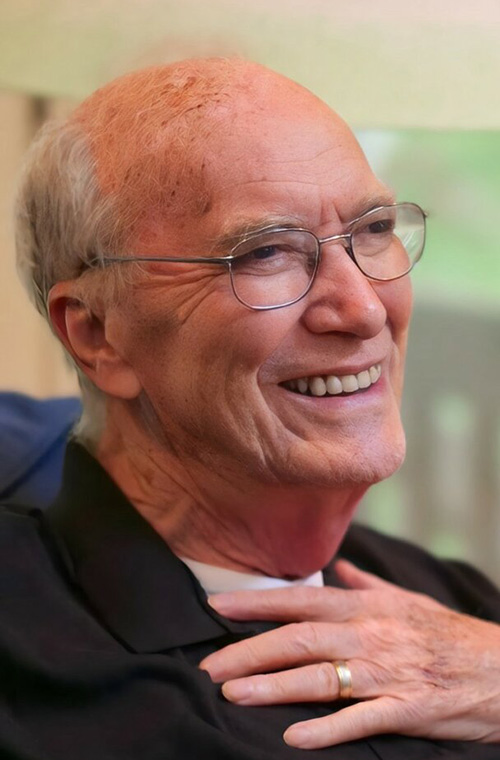In memoriam: Sterling Gaylen Bradley
Sterling Gaylen Bradley, a longtime professor of microbiology and immunology and a well-known science educator, died in Chapel Hill, North Carolina, on May 9. He was 92.

Born April 2, 1932, in Springfield, Missouri, Bradley went to Missouri State University where he completed his undergraduate studies in 1950 majoring in biology and chemistry. He pursued a master’s degree and a Ph.D. in microbiology at Northwestern University in Illinois, where he worked with Maurice Sussman in the biological sciences department on characterization of chemical and physical environment of the soil-dwelling eukaryotic organism Dictyostelium discoideum. He went to the University of Wisconsin in 1954 as a postdoctoral fellow under Joshua Lederberg and developed an interest in Streptomyces bacteria, the largest genus of Actinomycetota.
Following his postdoctoral study and a short stint as an instructor, Bradley was hired in 1957 as an assistant professor at the University of Minnesota where he continued to study the taxonomy of actinophage. After he became a full professor, he shifted to Medical College of Virginia at Virginia Commonwealth University in 1968 as a professor and chair of Department of Microbiology and Immunology and continued till 1996 when he retired and was named dean emeritus of the School of Basic Health Sciences.
Bradley’s research interests covered a wide area of bacterial lipopolysaccharide, interaction between bacterial endotoxin and therapeutic drugs, biology of the so-called brain-eating amoeba Naegleria fowleri and immunotoxicology. He had more than 200 publications with almost 3,000 citations.
Bradley held several prestigious academic positions during his career. He was the vice president for academic affairs at the University of Maryland Biotechnology Institute from1996 to 1999 and a visiting professor and interim director at Penn State University from 1999 to 2012. As a consultant, author and lecturer, he promoted global outreach programs, research integrity, public science education and science policy.
A longtime member of the American Society for Biochemistry and Molecular Biology, Bradley had a letter published in the September 2005 issue of ASBMB Today titled “‘Intelligent Design’ does not belong in the science classroom.”
Bradley was known as a committed mentor to people at all stages of their education and careers, according to a family obituary. In addition to guiding doctoral candidates and junior faculty, he hosted international students through Rotary International and was a leader in Boy Scouts and Indian Guides.
Bradley is survived by his wife, former ASBMB president Judith Bond; four children and their spouses; eleven grandchildren; and seven great-grandchildren.
Enjoy reading ASBMB Today?
Become a member to receive the print edition four times a year and the digital edition monthly.
Learn moreGet the latest from ASBMB Today
Enter your email address, and we’ll send you a weekly email with recent articles, interviews and more.
Latest in People
People highlights or most popular articles

Kiessling wins glycobiology award
She was honored by the Society for Glycobiology for her work on protein–glycan interactions.

2026 ASBMB election results
Meet the new Council members and Nominating Committee member.

Simcox wins SACNAS mentorship award
She was recognized for her sustained excellence in mentorship and was honored at SACNAS’ 2025 National Conference.

From humble beginnings to unlocking lysosomal secrets
Monther Abu–Remaileh will receive the ASBMB’s 2026 Walter A. Shaw Young Investigator Award in Lipid Research at the ASBMB Annual Meeting, March 7-10 in Washington, D.C.

Chemistry meets biology to thwart parasites
Margaret Phillips will receive the Alice and C. C. Wang Award in Molecular Parasitology at the ASBMB Annual Meeting, March 7-10 in Washington, D.C.

ASBMB announces 2026 JBC/Tabor awardees
The seven awardees are first authors of outstanding papers published in 2025 in the Journal of Biological Chemistry.

